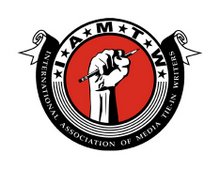Mark Charan Newton: You see it frequently these days – a literary fiction star such as Jonathan Lethem wanting to write a comic strip for Omega the Unknown, or Jodi Piccoult writing a Wonder Woman series. There’s a sense of reverence and pedigree involved. It has cool factor. But those authors are writing for a franchise that is not creator-owned. It’s not their world; the characters are often not their own. But let’s go the other way. For an author to write tie-in fiction – that is, fiction connected to a franchise or character, that isn’t technically owned by the author – it is still treated as a gaucherie by the majority of genre fans. The books suffer by not getting proper review coverage, and sometimes they are not even considered as ‘real’ works. Why do you think tie-in fiction is treated as the second-class citizen of the genre world?
[...]Dan Abnett: There are any number of contributing factors, and many of them are inevitably contradictory. Let’s start with a basic assumption: if you write as a hired gun, you must be in it for the dosh. You don’t really care what you’re writing. Therefore (obviously), you’re just crapping it out, words per square inch. In other words, tie-in fiction MUST by the very nature of its manufacture, be poor, disposable and second-rate.
It’s possible that an awful lot of people think this. They may not even mean to think it. There’s also a possibility (actually, a very high probability) that an awful lot of people in what I’m happy to refer to as “my line of work” believe that’s what other people think.
I think it’s worth getting this out of the way right at the start: writers of tie-in fiction may, sometimes, involuntarily, feel slightly guilty. They may be, involuntarily defensive. They know what the perception can be, and it contaminates them slightly. Tie-in writers can be their own worst enemies.
[...]Mark: It’s interesting you mention the money as a perceived incentive, and you’re quite right. But I suppose without naming names, there have been writers who have been strapped for cash and wanted to do tie-in fiction because they thought it was easy money. Hang around at a convention bar and you’ll hear those stories. So, as an aside – you’ve written both original fiction and tie-in fiction, so which do you find is easier?
Dan: I actually think it’s harder to write for franchises in many ways, as you’re constantly checking (or you damn well should be!) that you’re remaining true to the source, in terms of detail, fluff, character and style. It’s quite demanding to be so engaged, so ‘on’, permanently policing your actions within the boundaries of someone else’s property. In your own work, you only have to check with yourself about where the edges are. This labour is OF COURSE counter-balanced by the creative efforts involved in original invention – let me just say that before anyone has an indignant spasm.
New review of KORAK AT THE EARTH'S CORE!
-
Thank you so much to Carlos M. Fernandez for his 5-star Amazon review of KORAK
AT THE EARTH'S CORE!
Carlos M. Fernandez
[image: ⭐️][image: ⭐️][image:...
1 month ago








No comments:
Post a Comment